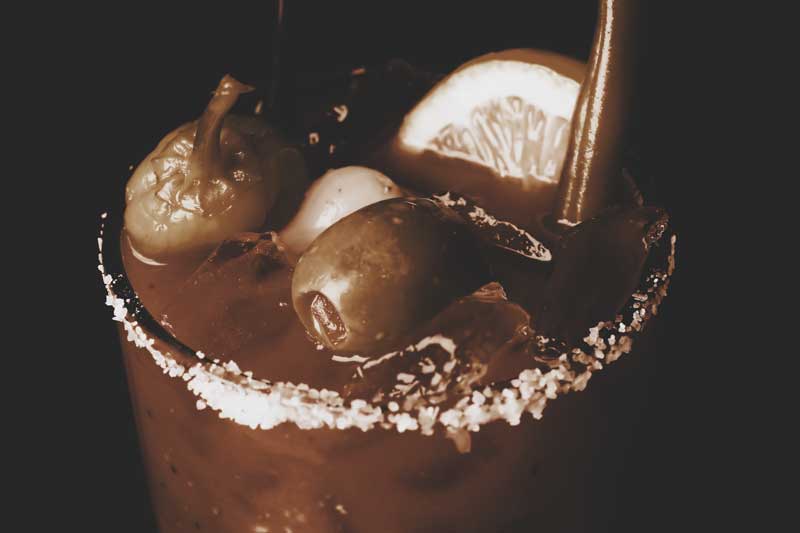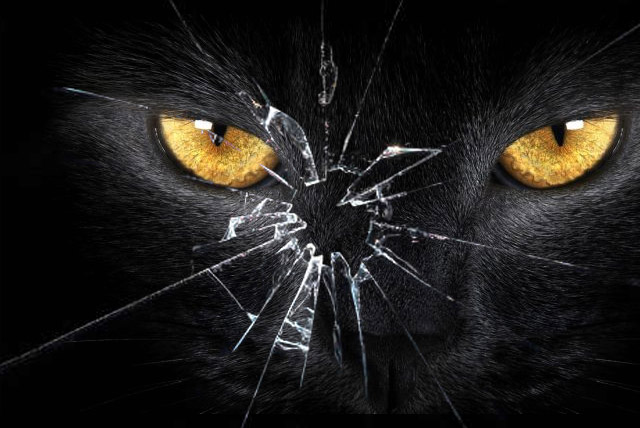
Even if you consider yourself a pretty logical person, there’s a good chance you’ve succumbed to the pressures of knocking on wood after a particularly optimistic phrase or walking a few feet to the left just to avoid traipsing under a ladder. (That’s honestly just a safety thing though, so you know, maybe keep doing that one.) The point is even today in a world of Bill Nye and Cosmos reboots, superstitions can still weasel their way under our otherwise pretty sensible skin, but why? And what is the origin of some of the most prevalent irrational beliefs that have lasted for centuries?
Well, if you’re the kind of person that backs away from black cats or wouldn’t be caught dead on the 13th floor, read on. (Or don’t – it’s not like you’ll get 5 years of bad luck from not finishing an article on the internet…right?)
Never Toast With Water In Your Glass

This superstition came to us straight from the Greeks. Originally, making a toast to a guest of honor had two different meanings depending on if that guest was deceased or alive and able to bask in the glory of the moment with you.
Toasting a living person was considered a prayer you were making to the gods, usually for good health or fortune to be bestowed on the person. Greek gods liked to party and as such, a watery toast was pretty lackluster in their opinion. Not only would the toast likely be ignored, but it could actually anger the gods to the point of bestowing ill fortune upon the parties involved.
Water was perfectly acceptable in a toast to the dead, however. Deceased Greeks were believed to go to the Underworld where they would drink from the Ameles Potamos, or River of Unmindfulness, AKA River Lethe, in order to forget their past transgressions. As such, a toast to a recently deceased person would almost always be with a glass full of water, to represent their journey along the river.
It was believed that mixing these actions and toasting a living person with a glass full of water could even bring about a watery death to those involved.
Walking Under A Ladder

This is one that dates back centuries, but varied in its severity and reasoning depending upon your location and time in history.
Most attribute the original superstition to ancient Egypt. It’s no surprise that Egyptians loved their pyramids, even going so far as respecting anything that slightly even resembled a pyramid, such as a ladder leaning against a wall. It was thought that if someone walked under the ladder they had ruined the sacred power of the pyramid.
Similarly, the ladder superstition was held by early Christians, who believed that the triangle shape signified the Holy Trinity – the Father, Son and Holy Ghost. Walking under a ladder then was a sign of blasphemy and could even invite the devil into the unfortunate soul that passed underneath.
Another superstition surrounding ladders dates back to medieval times and may actually have arisen from safety concerns. In medieval times ladders were often used during a hanging, with the doomed person being strung up on the top rung. If a person walked under the ladder, it wasn’t uncommon to have falling bodies that could cause injury or death. Because of this, it was believed that the angry soul of the damned haunted the triangle under the ladder and would bring harm to anyone that disturbed them.
Black Cats Are Bad Luck
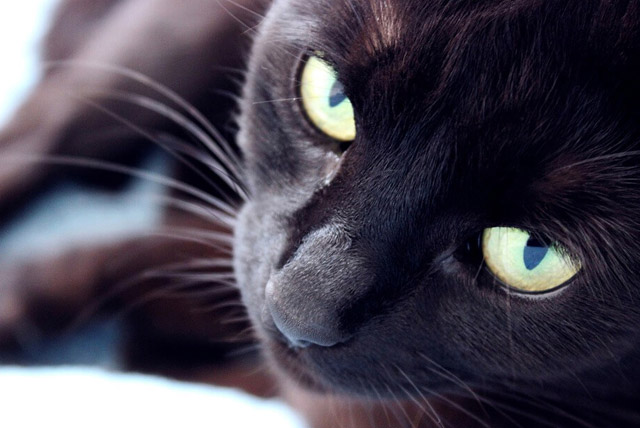
This is another myth with various iterations and origins depending on the location. In Europe during the middle ages, cats were often seen as evil due to fears surrounding witches and hags, who it was believed kept the cats as assistants to carry out their deeds, or even turned into black cats themselves. This fear of witches is likely what lead to the fear of all black cats (and black ravens) through Germanic and Nordic tribes. Monotheistic religion was another reason cats were feared. Due to polytheistic religions that worshipped cats as idols early Christians often viewed them as an abomination or perversion of their religion, therefore they were seen as evil.
Sailors and pirates had an interesting relationship with the beasts and viewed a black cat walking on board a ship and staying as a good omen, however, if the cat walked on and then quickly departed, it was feared the ship would sink.
It is likely the persecution of black cats that lead to the boom in the mice population which kicked off the Bubonic Plague, so maybe it was the killing of black cats that was actually unlucky.
In fact, ancient Egyptians would have likely subscribed to that mentality. Cats, in general, were revered in Egypt for the services they provided, keeping grain and other foods free from small pests. Cats were often seen as the embodiment of gods, particularly black cats – whom the Egyptian goddess Bastet is modeled after. Killing a cat in Egypt wasn’t just bad luck; it was against the law, sometimes holding a penalty of death.
Lucky Rabbits Foot

This is an interesting one. Animal totems and subsequently carrying or using animal parts for luck dates back centuries and has included all sorts of weird things, like raccoon penis bones and scarab beetles. But perhaps the most commonly known one is the lucky rabbit’s foot.
Tracing down the origins of this one is difficult, but most historians believe it stems from African Hoodoo or folk magic. Throughout many cultures, rabbits have been seen as symbols of fertility and messengers to the underworld (due to them burrowing underground).
Lucky rabbits’ feet were likely originally carried around to aid in fertility and other health maladies, even arthritis according to a 16th-century work by Reginald Scot. Eventually, rumors took off proclaiming that rubbing a rabbit’s foot before an event, performance or presentation would bring the bearer good luck in addition to the believed health benefits.
Perhaps the oddest part of rabbits’ feet, (besides, you know, carrying around the foot of an animal and expecting it to aid you in some supernatural way), was the way original rabbits’ feet were collected. According to advertisements from the period, lucky rabbit’s feet were always made from the left, hind foot of a rabbit, which was seemingly contradictory, as left hands and feet were seen as evil. Merchants would additionally tack on other specifications to set their brand of lucky mammal appendage apart, often boasting that the rabbit was killed in a cemetery at midnight, over the grave of a malicious murderer, sometimes on a Friday the 13th or a full moon, or even by a person with red hair. Basically, the more unlucky the circumstances surrounding the removal, the more good fortune the foot would bring its bearer.
While we can’t really speak to how much luck a rabbit’s foot brings us humans, it’s historically definitely not been a very lucky tradition for rabbits.
Bad Luck Comes In Threes

You may have heard this phrase a lot in 2016 following the tragic deaths of many beloved actors and musicians, maybe with a slight variation like “death always comes in threes”. In fact, this is likely one of the few superstitions that even the most logical among us will extend as a warning or expression of grief. But why is this one so commonly accepted and why has it persisted throughout the years?
This myth actually has a pretty easily explained origin and it has everything to do with human psychology. Confirmation bias is described as a tendency to search for or interpret information that confirms our existing viewpoint. The way it fits in with this superstition is actually pretty simple.
Basically, bad and good things are happening all the time to everybody in various degrees of severity. Most of these things you don’t really consider bad or good, unless they’re major life changing events OR unless someone points out an otherwise mundane streak of bad luck. Say you woke up late and got to work only to find you left your lunch at home during the chaos of trying to get out of the door. If a coworker proclaims “Well, bad luck always comes in threes!” at your misfortune, you’re likely going to be looking for the next “bad” thing to happen to you. And it probably will, because…well, bad and good things are happening all the time to everybody. Simple as that.
Step On A Crack…
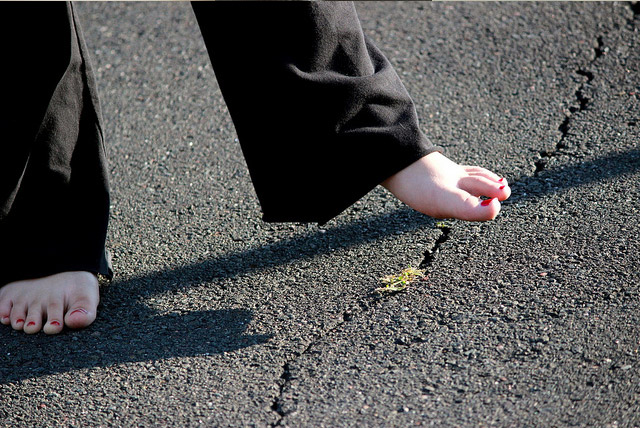
“…Break your mother’s back.” At least that’s probably the one you’re most familiar with, but versions of this phrase vary pretty dramatically. From the more tame, “step on a hole, break your mother’s sugar bowl” to a bizarre warning to mid 20th-century children to avoid stepping on cracks or else risk being devoured by bears that were waiting right around the next corner. No idea how they made that into a rhyme, but I guess some kids just weren’t phased by the possibility of breaking their mothers’ backs.
While various interpretations and versions have existed throughout the years, this one really boils down to cracks and holes in the ground leading to the underworld or Hell, and the belief that stepping on them could release spirits or demons, potentially even leading to a possession of the unfortunate stepper.
Knock On Wood

Knocking on wood after a phrase of optimism or discussing good fortune is a tradition that likely dates back to ancient pagan cultures.
Ancient Celts and other pagan groups tended to focus their worship on the natural, rather than the supernatural and as such held a deep affinity for the earth – trees, plants, animals, etc. Often the supernatural and natural would merge with the belief that spirits or gods would actually reside in things like trees.
Pagan practitioners would likely touch the wood of trees after proclaiming a desire for good fortune as a way of interacting with the spirits inside, either asking them for their blessing or thanking them for their assistance. Knocking on wood follows the same line of reasoning, except the act of knocking loudly was to scare off any malicious spirits that might want to mess with your good fortune.
Wishing On A Wishbone

Chicken bones have been used for centuries in sacred rites and rituals as a tool for divination. The Kammu people of Southeast Asia typically used a thigh bone from a rooster or hen as a way to tell the future or to discern one’s fortune.
The belief that bird bones held some sort of mystic divining powers is likely what led to the Roman practice of squabbling over turkey bones after a meal, specifically the large “wishbone”. When a bone would come up for grabs, first century Romans would argue over them (likely in a jovial “bridesmaid catches the bouquet” fashion) and whoever got the biggest piece was said to get whatever they wished for.
And speaking of Romans and wedding traditions…
Carrying The Bride Over The Threshold

Evil spirits really seem to love ruining a good time. As such, newlyweds are often the target of malevolent spirits that want to put a damper on things.
In ancient times it was believed that evil spirits would do everything they could to prevent the happy couple from staying together, right up to hovering around the threshold of the newlywed’s home on the off chance that one would be able to enter the bride through the sole of her foot as she stepped into her new residence.
For the Romans this act also had the “polite” and societal benefit of allowing a woman to feel really “ladylike” by pretending that she wasn’t looking forward to the marital night, and needed to be carried across by her much more eager partner; and in even more primitive cultures, where women were literally dragged across the thresholds during forced marriages.
Wedding traditions are just so sweet!
Breaking A Mirror Will Bring Bad Luck

Reflections and images of our selves have always fascinated society. Self-portraits are easily one of the most common recurring themes among all art forms, and faces are one of the first things that we learn to read and recognize. It goes without saying then that we place a lot of importance on our image and thus, on items that can reflect that back to us.
Some cultures, including Romans, Greek, African and Indian cultures, placed such esteem upon a mirror that it was feared it could actually capture part of one’s soul. Breaking a mirror could mean that part of your soul was actually lost and trapped inside of the world reflected.
To them, it wasn’t just a broken mirror; it was part of their soul that fractured. It wasn’t a stretch to believe that their health and wellbeing would diminish shortly after.
For the Romans, seven years of bad luck or health was said to follow, as it was believed to take roughly seven years to rejuvenate a person’s missing or damaged soul.
Eventually, rituals -such as grounding the mirror to powder to remove the potential for reflection- could be performed to offset the misfortune, thereby reducing the impact of bad luck to simply being out of a maybe decent mirror.
Spilling Salt Is Bad Luck
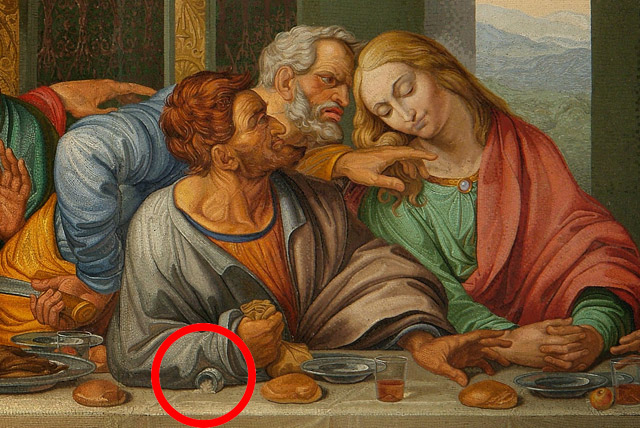
You’ve likely seen this one in action when a friend or family member accidentally knocks over the table salt and quickly grabs up a pinch to toss over their left shoulder. When it happens, it’s normally done so quickly and without effort that no one at the table even discusses why they just performed a centuries old ritual that supposedly wards off evil.
Salt was a pretty precious resource that we really take for granted today, but at one point it was a fairly expensive commodity. Haphazardly spilling salt was an indicator that the devil was nearby and looking to make some mischief, so tossing some over your left shoulder, where the devil supposedly sits, would hopefully blind him and make him leave you alone.
This belief was so widely held that references to this superstition are even seen in Da Vinci’s The Last Supper. Judas, the disciple that betrayed Jesus, is painted as having knocked over the salt with his elbow, thereby offering the devil an invitation to enter the scene and cause harm.
Spilled milk may not have been a huge deal, but spilled salt was definitely worth crying over.
Witch Swimming

Most of the superstitions on this list are fairly tame, and though their origins have roots in the supernatural, the ideas and rituals associated with them are pretty harmless. Not so much for this one.
Witch Swimming, or simply “the swimming test” was an awful practice where supposed witches were forced to a lake, stripped to their underclothes, often bound up, then thrown into the water to see if they would float. It was reasoned that since witches had “spurned the sacrament of baptism” that the water would fully reject them and their bodies would float on top. Anyone that sunk to the bottom and drowned was a mere mortal and it was chalked up to a loss – but hey, you gotta break a few eggs to make a witch omelet, or something. (Actually, most people were tied to a rope so they were brought back in, only causing an accidental drowning every now and then, so, you know, not as bad, maybe?)
This superstition actually comes from an even older and somehow more archaic ritual of a “trial by water” where suspects of crimes, witchcraft, and sorcery were thrown into moving waters and simply left there for the gods to determine their fate. This was such an awful practice that it was actually banned in THE MIDDLE AGES (you know, the time period renowned for their insane torture devices) as being too cruel. It didn’t take long, however, before it was brought back and altered into the above mentioned Christian witch detector.
The Number 13

Last but not least is the number 13. We’ve talked about why Friday the 13th is unlucky and the fear of 13 before. Here’s a new one you may not have heard. 13 has been seen as an unlucky or evil number for centuries and throughout almost all cultures and religions on the planet.
Noted references throughout Christian mythology state that Judas was the 13th person to take a seat at the table for the last supper (promptly before spilling his salt) and that the last supper itself (sometimes retold as the crucifixion of Jesus) was supposedly on the 13th day of the month. But it isn’t just Christians that fear the number 13. Zoroastrians, from what is considered the world’s first religion, predicted that evil would reign supreme in the 13th millennium.
And it wasn’t just ancient religions that viewed the number 13 as a bad omen. Even today in various parts of the world hotels and other buildings will “skip” the thirteenth floor, going straight from 12-14. People often avoid planning important events like weddings and celebrations on the 13th and some even forego going to work or traveling on the date. But why?
The Hammurabi may be the origin of the number 13’s unluckiness
This one likely dates back to the world’s first legal document, The Code of Hammurabi. No, not Harambe, The Hammurabi. The Hammurabi consists of 282 rules, fines and punishments for territories from Babylon to the Euphrates River and most of southern Mesopotamia. Due to a clerical error, the Code of Hammurabi accidentally omitted the 13th law from the book. But it wasn’t even that the 13th law wasn’t included, seeing as the laws weren’t actually numbered in the document. No, this was an even more simple error from a translator that forgot to include the line of text altogether.
Yep. A simple error led to hundreds of years of fear for millions of people around the entire globe.
Consider that the next time you make a typo at work.


